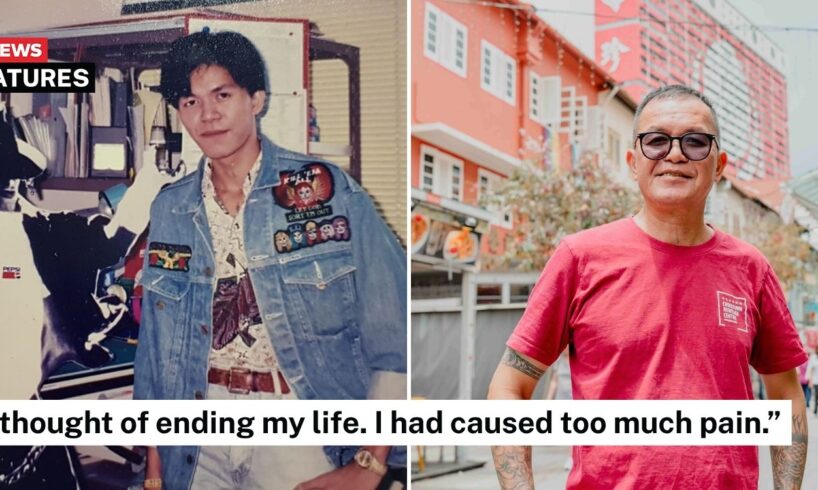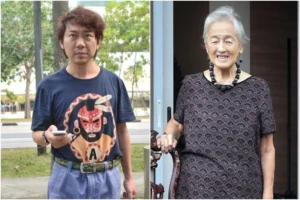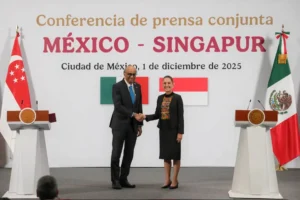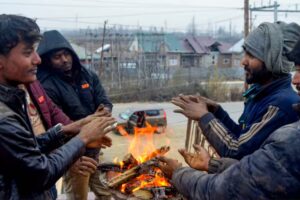
From gangster to guide: Former drug abuser finds redemption in Chinatown’s back alleys
In the heart of Chinatown, where the smell of incense lingers and the echo of temple bells hangs in the air, a man with close-cropped hair leads a small group of visitors through the narrow back lanes.
Once a drug abuser and convict, Alvin Chiong is now a licensed guide — walking the same alleys that witnessed his darkest days with a new purpose.
Through the Architects of Life “Triad Trails” walking tour, the anti-drug advocate tells stories of transformation amid shophouses that hid opium dens and secret society hideouts.
However, the stories he tells are not just history, they are his own.
Alvin’s drug and gang-ridden youth saw him undergoing three halfway house stays, incarceration, and caning.
This is the story of the man once called Ang Kong Kia and how he found redemption, faith, and unconditional love that stayed through it all.
Source: The Smart Local
A samsui woman’s grandson, born to a drug abuser father
Alvin’s roots are as humble as they come.
His grandmother was a Samsui woman — a red-hooded labourer who carried bricks across construction sites.
His father, once a skilled master tailor, was also an opium addict.
“When I was born, my father was already 51… he smoked opium, he gambled, he drank,” said Alvin, whose mother left the family when he was only seven years old.
To avoid the domestic violence at home, the tour guide added that he and his elder brother spent most of their time in the streets.
“This is how I started to mix with all those neighborhood boys,” said Alvin.
To escape the fights and the loneliness, he wandered the neighbourhood, seeking warmth where he could find it.
“I just wanted to belong, to be seen,” he said.
However, he found belonging in the wrong places — with older boys, gang members, and street hustlers.
By the age of ten, he was sniffing glue, smoking, and popping sleeping pills.
Photo courtesy of Alvin Chiong
“That’s how it started,” Alvin said simply.
“You just do what everyone else is doing. Then, one day, someone pushes you, and you’re in.”
He sought acceptance in a gang
The gang gave him what family did not: protection, purpose, pride.
However, this new-found sense of belonging came with a price.
By his late teens, he helped the gang to fight and sell drugs.
Photo courtesy of Alvin Chiong
While in the gang, Alvin did not use drugs heavily as there was a rule against personal consumption.
“Once you’re caught, you can’t hand over business properly, you’re finished,” he explained.
However, everything changed when he left his gang leader at age 19.
Addiction crept in quietly, then consumed everything — his freedom, his health, his family.
Losing everything: His will to live, his wife, his children
Alvin met his wife when they were both sixteen — childhood sweethearts from different worlds.
She was grounded and calm, while he was already deep in the street life.
They married in 1997, but Alvin’s addiction to heroin and sleeping pills shadowed their union.
“She suspected, but she never had proof,” he admitted.
That proof came one morning when she found him collapsed in the toilet, drug paraphernalia scattered around him.
Although Alvin had grown up thinking his father’s drug usage was normal, his wife did not want that for their children.
Terrified, she gathered their two sons and left.
Photo courtesy of Alvin Chiong
“It was the best decision she made,” Alvin said quietly.
“My kids didn’t have to grow up seeing what I saw as a child.”
The years that followed were a blur of prison life and failed rehabilitation attempts.
He had three stays in two halfway houses: The Watchmen Home and Yile, which is no longer is in operation.
Each time, he tried to stay clean.
However, each time, he relapsed.
“After my last incarceration in 2008, I wanted to die,” he admitted.
“I thought of ending my life. I had caused too much pain.”
Instead, he checked himself into another halfway house — and this time, something changed.
“I surrendered,” he said.
“I told God I cannot do this anymore. Please help me.”
For the first time, Alvin stopped trying to quit on his own.
He volunteered at churches, joined support groups, and surrounded himself with people who understood his fight.
“We help each other stand up again,” he said.
“If one falls, the others pull him back.”
Photo courtesy of Alvin Chiong
‘Do you want to come back?’
Two years later, after he had left the first halfway house, Alvin received a question from his ex-wife.
It was simple: “Do you want to come back?”
Then, he was on civil terms with his ex-wife, visiting his children once or twice a month.
“I told her, I’ve hurt you too much, I don’t want you to feel unsafe,” he said, allowing his wife to take more time to think.
“I wanted to make sure she’s feeling confident and comfortable about my return.”
Eventually, she asked him to come home again, and again.
The third time, Alvin said yes.
Photo courtesy of Alvin Chiong
Before moving home, Alvin gathered his family — his wife and their two sons, then aged 16 and 11.
He apologised for everything, the drugs, the lies, the years lost, before asking his sons for their blessing to remarry their mother.
“They said yes,” he smiled.
“So in 2016, five years after our divorce, we married again.”
From drug abuser and gangster to guide
The former drug abuser now walks the streets of Chinatown as a man free of his vices.
As a tour guide, Alvin shares stories of the area’s gritty past and also helps out in the Chinatown Heritage Centre’s ‘Under One Roof’ tour.
When he is not busy showing people around, Alvin serves as a prison counsellor, a Singapore Anti-Narcotics Association (SANA) peer leader and befriender, and a volunteer case officer with the Singapore Prison Service.
On weekends, he also conducts chapel classes in rehab centres and gives talks to students about peer pressure.
He calls one of his student programmes ‘Risky Business’, helping youths recognise how small decisions can spiral.
“When people ask why I do this, I tell them it is because I know the pain it causes,” he said.
“Not just to us, but to everyone who loves us.”
Helping others find the way back
“When you’re deep in addiction, you think you’re alone,” Alvin said.
“You think no one will understand. That’s the biggest lie.”
He keeps a simple system with his recovery group — three words sent in a moment of weakness: “I need help.”
“When we see that, the phone calls start coming,” he smiled.
“We check in, we talk, we pull each other back.”
To him, healing begins with honesty, transparency, and accountability.
“If someone really wants to change, they must first admit they need help,” he said.
“Don’t be ashamed to ask. There’s always a way back, even when you think it’s over.”
He pauses. “I lost everything once, but it was in losing everything that I found God, found peace, and found my family again.”
A new chapter for former drug abuser and convict
As the tour winds down, Alvin stops near a quiet alley.
He holds up a small stuffed toy modeled after himself, its angry face catching the afternoon light.
When people ask him why it has such a fierce expression, he says:
Because that was me, but I’m not angry anymore.
The man once called Ang Kong Kia smiles.
He is no longer the boy who went looking for love on the streets, he is the man who finally came home.
Also read: S’poreans & PRs who use Kpods overseas can be prosecuted in S’pore under Misuse of Drugs Act
S’poreans & PRs who use Kpods overseas can be prosecuted in S’pore under Misuse of Drugs Act
Have news you must share? Get in touch with us via email at news@mustsharenews.com.
Featured image courtesy of Alvin Chiong and photography by Thea Imelda Koh for MS News.





